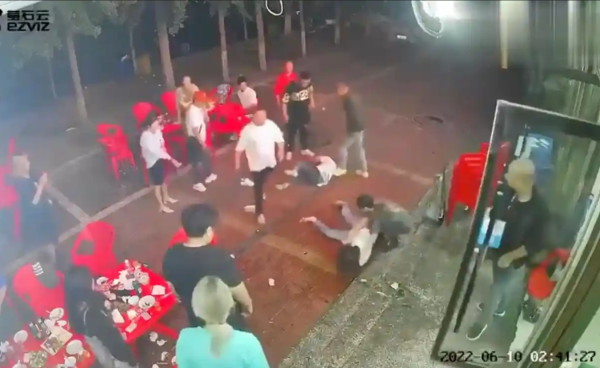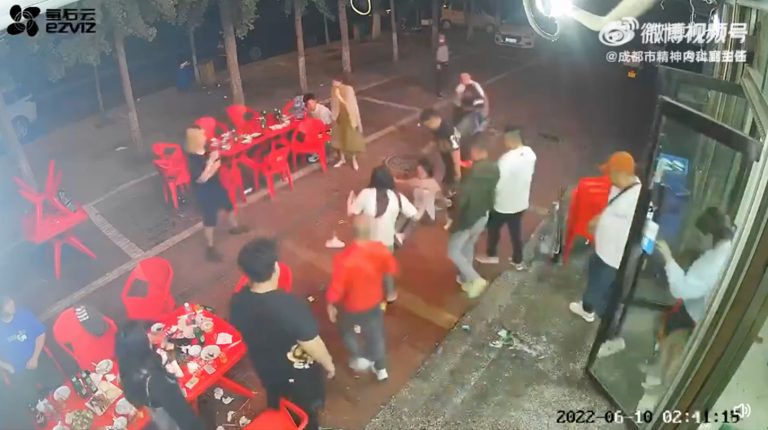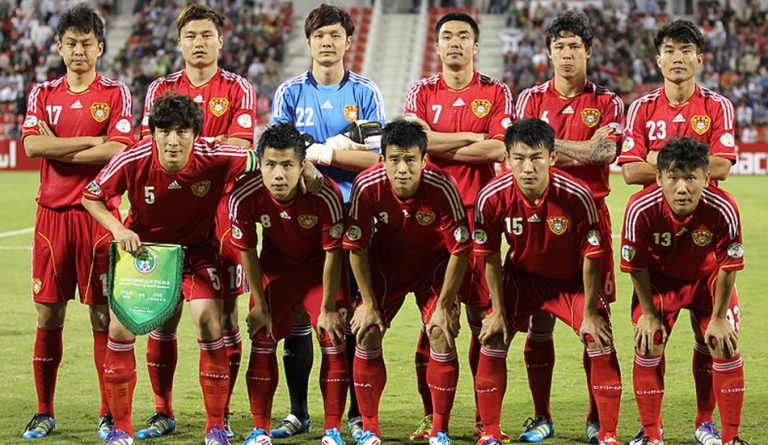A vicious attack on a group of four women in the northern city of Tangshan has set China’s social media ablaze as netizens demand an in-depth investigation into the incident and for the parties involved to be held accountable.
Now, five police officers, including the city’s deputy chief, are being investigated over their poor handling of the incident as mounting pressure from the public casts shade on public security in Hebei — the province where Tangshan is located — and the Chinese authorities in general.
The assault, which took place in the early hours of June 10, saw several women being repeatedly kicked and punched by a gang of men both inside and outside the restaurant. After footage of the incident was leaked online, it sent shock waves across Chinese netizens and ignited a public outcry of support for the attacked women.
RELATED:
- Could Beijing’s COVID Restrictions Lead to Mass Protests?
- US Authorities Bust Major Drug Operation in Oregon Linked to Chinese Triad
- Chinese Authorities Turn Up Heat On Activists Ahead of Tiananmen Massacre Anniversary
- In Japan, Insulting Someone Online Could Now Land You in Jail for a Year
Harassment escalates to violence
Surveillance footage circulated online showed a man placing his hand on a woman’s back as she shared a meal with three friends. The woman could be seen trying to push him away as he strikes her in the face and drags her outside by her hair where he is then seen repeatedly punching and kicking her as she laid on the ground.
As the brief interaction escalated into full-blown chaos, other diners were seen getting involved in trying to separate the group and attempt to calm the men down.
Success
You are now signed up for our newsletter
Success
Check your email to complete sign up
Another woman who tried to come to the other’s aid was then knocked to the floor with a chair and repeatedly kicked and punched by the first assailant’s companions. Audio picked up from the security camera suggests the men considered raping their victims following the assault.
A day after the attack, the Tangshan Public Security Bureau (PSB) — the city’s police — issued a statement stating that two of the women were hospitalized with “non-life-threatening injuries” and were in “stable condition,” though no further information was provided. The victims, as well as their friends and family, have also remained silent.
The local branch of the state-run China Women’s Federation on June 13 dismissed online rumors that the women had been sexually assaulted or murdered off-screen.

‘A city with no credibility’
On June 11, the Tangshan police said that nine suspects, including seven men and two women, had been arrested in relation to the attack. According to state-run China Central Television (CCTV), three of the nine were members of the “Tian’an Society,” a triad gang based in Jiangsu Province.
That day, the Tangshan PSB also announced a campaign to “eliminate gangs and criminal elements” in the area, while the Hebei provincial public security department ordered police from Langfang — another city in the province — to Tangshan to handle the criminal investigation.
Further, on June 12, the Tangshan municipal government launched a “special rectification operation” against gangs, as a part of which it would accept complaints from the public.
However, criticism from Tangshan, Hebei, and the rest of China targeted not just underworld elements, but took aim at the authorities and what many saw as incompetent handling of the attack.
Netizens questioned why it took so long for the police to respond to emergency calls. According to social media posts, it took three hours for officers to leave the nearest PSB station just 800 meters from the restaurant, despite eyewitnesses placing at least five calls for help.
Many Tangshan residents took advantage of the “special rectification” campaign and lined up outside the PSB office to make complaints of criminal activity. Additionally, many people took to the internet with their real names to expose local triad members in Tangshan.
However, Chinese media reported that many of those waiting did not receive any response for hours; meanwhile, some state-run outlets began to scrutinize the triad scene in Tangshan and collusion between gangs and officials.
A second, more detailed announcement regarding the incident released by the Tangshan police on June 21 met with more public anger. A hashtag concerning the restaurant attack on Weibo (a Chinese Twitter-like platform) was viewed 450 million times within hours.
“So there are no pictures or videos. Journalists are not allowed to interview [the victims], and only you yourself can release information,” one user said on Weibo, referencing the lack of transparent access provided to journalists and activists in the country.
“A city with no credibility, how can we dare trust the injury report? And how reliable is this police statement?” the user added.
Another user expressed concern about the predatory behavior and toxic masculinity exhibited by some men in China. “All of this could happen to me, could happen to any of us,” one commenter said in a post liked more than 100,000 times.
“How is this sort of thing still happening in 2022?” wrote another. “Please give them criminal sentences, and don’t let any of them get away.”
Provincial incident, nationwide ramifications
The provincial discipline commission of Hebei said that five officers, including the district head of the Lubei police force, Ma Aijun had been accused of “seriously violating discipline and law,” and would be reprimanded.
Hebei Province’s public security department announced separately in a June 21 statement that Ma’s deputy, surnamed Li, had also been suspended from his post.
The provincial police added that it had carried out “in-depth investigations into untimely police dispatch … and serious violations of discipline.” It also admitted the incident had “caused a bad impact and aroused widespread concern.”
In addition to the public uproar, the Tangshan restaurant attacks could have major repercussions on Hebei’s state security agencies.
Before the incident went viral, a person apparently associated with the men responsible for the assault had revealed that the attackers had spent 600,000 yuan to “resolve” the incident, suggesting that the Tangshan PSB may have been bought off.
Netizens also identified one of the nine suspects as Ma Yunqi, son of a Communist Party secretary in charge of political and legal affairs in the Jiangsu Province city of Xinghua — something that suggests a link between the officialdom and triad elements in that province.
SinoInsider, a political risk consultancy that focuses on Chinese political analysis, wrote in a June 20 newsletter entry that the Hebei provincial security apparatus has long been a nest of insubordination vis-a-vis the central leadership in Beijing.
“The Hebei political and legal affairs apparatus was dominated by the Jiang faction for decades, and is known to be particularly corrupt,” SinoInsider observes, referring to the former Chinese regime leader who is known to remain a force behind the scenes in Communist Party politics.
China’s current leader Xi Jinping, despite replacing many leading officials in the province’s police and Communist Party security organs, “had not been able to properly “rectify” the Hebei political and legal affairs apparatus during his 10 years in office,” the analysis says, noting that collusion between gangs, businesses, and the police was also especially prominent in the resource-rich city of Tangshan, including a case in 2007 that drew national attention.”
Several personnel reshuffles have taken place in Tangshan and Langfang — the city whose PSB has been tasked with handling the restaurant case, raising the “possibility that the Xi [political] camp allowed the Tangshan restaurant incident to blow up to facilitate its clean up of both the local PLAC and triads,” SinoInsider noted.













